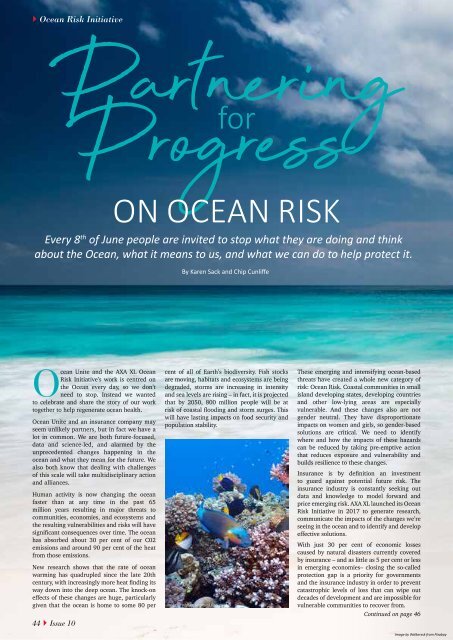MAINSAIL_low res-compressed
Create successful ePaper yourself
Turn your PDF publications into a flip-book with our unique Google optimized e-Paper software.
} Ocean Risk Initiative<br />
for<br />
ON OCEAN RISK<br />
Every 8 th of June people are invited to stop what they are doing and think<br />
about the Ocean, what it means to us, and what we can do to help protect it.<br />
By Karen Sack and Chip Cunliffe<br />
Ocean Unite and the AXA XL Ocean<br />
Risk Initiative’s work is centred on<br />
the Ocean every day, so we don’t<br />
need to stop. Instead we wanted<br />
to celebrate and share the story of our work<br />
together to help regenerate ocean health.<br />
Ocean Unite and an insurance company may<br />
seem unlikely partners, but in fact we have a<br />
lot in common. We are both future-focused,<br />
data and science-led, and alarmed by the<br />
unprecedented changes happening in the<br />
ocean and what they mean for the future. We<br />
also both know that dealing with challenges<br />
of this scale will take multidisciplinary action<br />
and alliances.<br />
Human activity is now changing the ocean<br />
faster than at any time in the past 65<br />
million years <strong>res</strong>ulting in major threats to<br />
communities, economies, and ecosystems and<br />
the <strong>res</strong>ulting vulnerabilities and risks will have<br />
significant consequences over time. The ocean<br />
has absorbed about 30 per cent of our C02<br />
emissions and around 90 per cent of the heat<br />
from those emissions.<br />
New <strong>res</strong>earch shows that the rate of ocean<br />
warming has quadrupled since the late 20th<br />
century, with increasingly more heat finding its<br />
way down into the deep ocean. The knock-on<br />
effects of these changes are huge, particularly<br />
given that the ocean is home to some 80 per<br />
44 } Issue 10<br />
cent of all of Earth’s biodiversity. Fish stocks<br />
are moving, habitats and ecosystems are being<br />
degraded, storms are increasing in intensity<br />
and sea levels are rising – in fact, it is projected<br />
that by 2050, 800 million people will be at<br />
risk of coastal flooding and storm surges. This<br />
will have lasting impacts on food security and<br />
population stability.<br />
Image by Stefanie Ferchland from Pixabay<br />
These emerging and intensifying ocean-based<br />
threats have created a whole new category of<br />
risk: Ocean Risk. Coastal communities in small<br />
island developing states, developing countries<br />
and other <strong>low</strong>-lying areas are especially<br />
vulnerable. And these changes also are not<br />
gender neutral. They have disproportionate<br />
impacts on women and girls, so gender-based<br />
solutions are critical. We need to identify<br />
where and how the impacts of these hazards<br />
can be reduced by taking pre-emptive action<br />
that reduces exposure and vulnerability and<br />
builds <strong>res</strong>ilience to these changes.<br />
Insurance is by definition an investment<br />
to guard against potential future risk. The<br />
insurance industry is constantly seeking out<br />
data and knowledge to model forward and<br />
price emerging risk. AXA XL launched its Ocean<br />
Risk Initiative in 2017 to generate <strong>res</strong>earch,<br />
communicate the impacts of the changes we’re<br />
seeing in the ocean and to identify and develop<br />
effective solutions.<br />
With just 30 per cent of economic losses<br />
caused by natural disasters currently covered<br />
by insurance – and as little as 5 per cent or less<br />
in emerging economies– closing the so-called<br />
protection gap is a priority for governments<br />
and the insurance industry in order to prevent<br />
catastrophic levels of loss that can wipe out<br />
decades of development and are impossible for<br />
vulnerable communities to recover from.<br />
Continued on page 46<br />
Image by Walkerssk from Pixabay
















